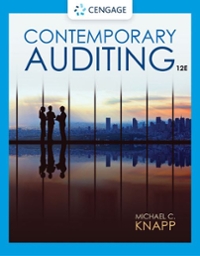Richard Grimes glanced at his wristwatch as he pulled into the nearly deserted parking lot of the
Question:
Richard Grimes glanced at his wristwatch as he pulled into the nearly deserted parking lot of the corporate headquarters of McCaleb Medical Corporation (MMC).1 It was 6:25 a.m. on a cold and overcast Friday morning in February. Based in a suburb on the south side of Pittsburgh, Pennsylvania, MMC manufactured diagnostic instruments used in medical laboratories. The company's common stock traded on one of the major stock exchanges. Richard, a staff accountant with a Big Four accounting firm, was a member of the MMC audit team. He and his colleagues were auditing MMC's financial statements for the company's fiscal year that had ended several weeks earlier on December 31.
Gwen Tomlinson, the audit senior who was supervising the fieldwork for the MMC audit, had given Richard permission to leave at 4 p.m. that day so that he could attend a family get-together in his hometown of Cumberland, Maryland, a two-hour drive from Pittsburgh. To compensate somewhat for his early departure, Richard had arrived at MMC's headquarters an hour or so before he and his colleagues typically began their workday.
Richard flipped on the lights as he entered a conference room on the third floor of the client's headquarters building that served as the home base for the MMC audit team. One end of the conference room was dominated by a large oval desk where Gwen could typically be found pounding away on her laptop computer, reviewing a file of audit workpapers, or wading through large stacks of client documents. The remaining two-thirds of the conference room was partitioned into cubicle workstations for Richard and the three other staff accountants assigned to the MMC engagement.
Two of those staff accountants were "rookies" who had less than three months' experience. Similar to Richard, the other staff accountant was beginning her second busy season in public accounting.
After spending a few minutes organizing his workstation for the day, Richard picked up a notepad on which he had jotted down identifying information for six equipment lease contracts that he needed to review. He then headed for a bank of file cabinets in a far corner of the third floor. The file cabinets were tucked in an L-shaped alcove adjacent to the office of MMC's controller, Alva Russell.
As Richard approached Russell's office, he was surprised to see the controller and Daniel Slater, MMC's president and chief operating officer (COO), leaning forward over Russell's desk with their backs to the open door of the office. The two men were having an animated conversation as they studied a large spreadsheet that was unfolded on the desk. Because he didn't want to interrupt them, Richard walked softly past the open door and then made an immediate left into the small alcove containing the file cabinets.
As quietly as possible, Richard opened the file cabinet drawer that contained MMC's equipment lease contracts. As he stood there, he alternately referred to his notepad and then leafed through the open drawer of the file cabinet to retrieve each of the contracts that he intended to review.
Questions
1. How, if at all, should MMC report the expected loss on the large receivable in its Form 10-K financial statements? Explain.
2. Place yourself in Richard Grimes’ position. What decision alternatives does he have after overhearing the conversation between Alva Russell and Daniel Slater? Which of these alternatives should he choose? Why?
3. Did Richard have a responsibility to make the two client executives aware of hispresence when he was outside of Russell’s office? Why or why not?
4. Do you believe that Daniel Slater would have reacted differently if the auditor in question had been a female rather than a male? Explain.
Step by Step Answer:






